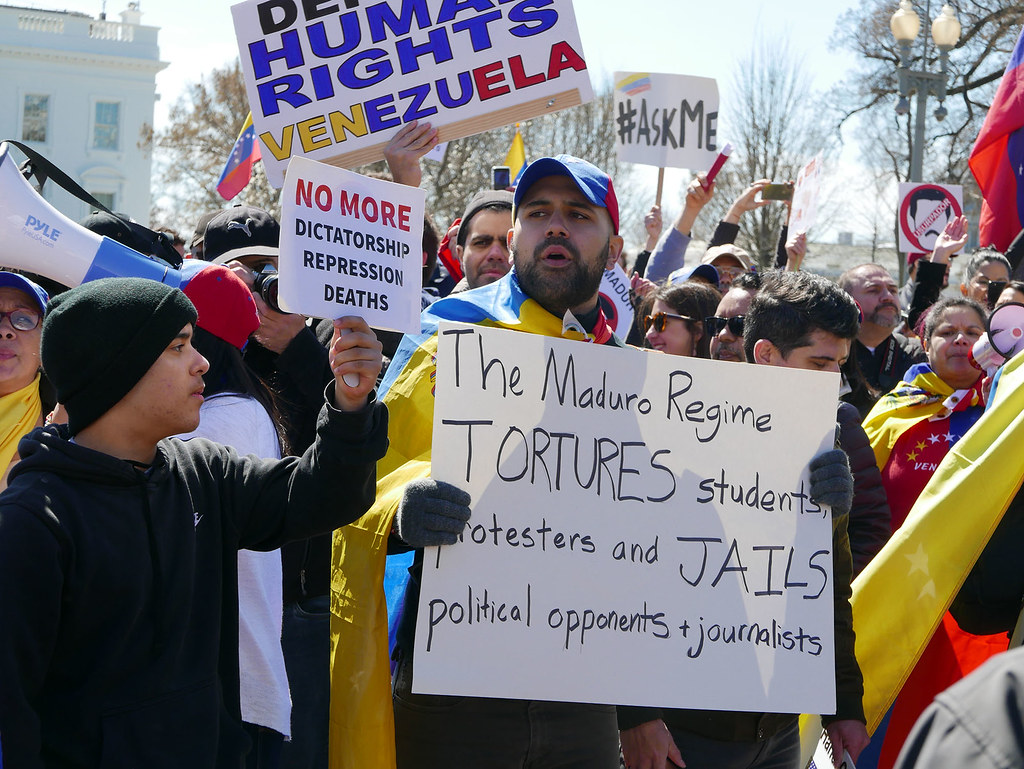Secondary menu
IHRP Working Group: Gender Apartheid in Afghanistan
Documenting atrocities committed by the Venezuelan government
By: Adrian Piecyk (2L) Credit: Creative Commons
Credit: Creative Commons
Leads: Adrian Piecyk (2L), Jason Quinn (2L)
Members: Betel Woldu (1L), Max Mickelson (1L), Aaditya Juvekar (1L), Shireen Faisal (1L), Stas Castro (1L), Tim Hong (1L), Arifah Razack (3L)
What is the Venezuela Accountability Project?
Since its founding in 2020, the Venezuela Accountability Project (VAP) working group's primary purpose is to document atrocities committed by the Venezuelan government under President Nicolas Maduro. The VAP operates under the broader Global Accountability Network (GAN), which researches and collects data on atrocities worldwide for use by international criminal prosecutors. The students who contribute to GAN projects, the VAP included, benefit from interacting with legal practitioners across the globe who have successfully prosecuted infamous abusers of human rights.
The Accountability System used by VAP and other GAN projects is a proprietary model used to analyze and catalogue the enormous amounts of evidence needed to prosecute atrocity criminals. It intends to create an actionable body of documents that international lawyers and local stakeholders can use to prosecute state agents and even heads of state responsible for committing atrocities. The Accountability System was pioneered by David Crane, GAN’s founder, in the successful indictment of the then-sitting President of Liberia, Charles Taylor. Since then, Accountability Projects have expanded to include Venezuela, Syria, Yemen, Ukraine, and the Pacific Rim region.
What does VAP do?
Students involved in the VAP play a key role in creating the “cornerstone documents” that GAN then uses for its dossiers on atrocity criminals. These documents are built from the chronological conflict narratives and crime base matrices that students prepare, utilizing both official reports prepared by NGOs, as well as open-source investigation (OSINT). GAN lawyers use the work produced by students to identify the Most Responsible Parties (MRP) and the Most Egregious Incidents (MEI) for a given atrocity project. Students gain valuable insight and experience in profiling atrocity criminals, as Venezuela in particular has many distinct security and intelligence agencies committing crimes alongside paramilitary colectivos.
Local stakeholders also play a key role in drafting objectives for atrocity projects. With their help, VAP can appropriately focus on particular incidents and perpetrators as the situation demands. The previous year’s team was, for example, asked to put special care in researching incidents involving crimes committed by the Venezuelan regime against military or security services personnel for perceived disloyalty.
What was VAP’s most recent work?
Our VAP team this year was predominantly composed of a fresh cohort of 1Ls, who continued the work of the previous year’s “first team” in preparing conflict narratives and crime base matrices. Each student was assigned a given month to research on, with the VAP cohort covering the tumultuous period from April-October 2019 in Venezuela. This period was defined by an abortive uprising in support of presidential challenger and opposition leader Juan Guaidó on April 30th, with an ensuing period of extreme repression by the victorious Maduro regime.
Recent events have also propelled Venezuela back into the media spotlight compared to the previous year. The ongoing dispute between Venezuela and Guyana escalated in December 2023 after a referendum nominally annexed the oil-rich Essequibo region into Venezuela. Time will tell what these events may mean for future VAP projects.
